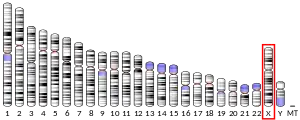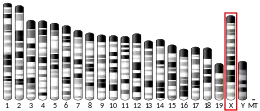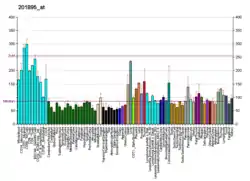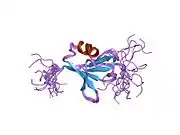ARAF
Serine/threonine-protein kinase A-Raf or simply A-Raf is an enzyme that in humans is encoded by the ARAF gene.[5] A-Raf is a member of the Raf kinase family of serine/threonine-specific protein kinases.[6]
| ARAF | |||||||||||||||||||||||||||||||||||||||||||||||||||
|---|---|---|---|---|---|---|---|---|---|---|---|---|---|---|---|---|---|---|---|---|---|---|---|---|---|---|---|---|---|---|---|---|---|---|---|---|---|---|---|---|---|---|---|---|---|---|---|---|---|---|---|
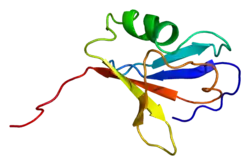 | |||||||||||||||||||||||||||||||||||||||||||||||||||
| |||||||||||||||||||||||||||||||||||||||||||||||||||
| Identifiers | |||||||||||||||||||||||||||||||||||||||||||||||||||
| Aliases | ARAF, A-Raf proto-oncogene, serine/threonine kinase, A-RAF, ARAF1, PKS2, RAFA1, Serine/threonine-protein kinase A-Raf | ||||||||||||||||||||||||||||||||||||||||||||||||||
| External IDs | OMIM: 311010 MGI: 88065 HomoloGene: 1249 GeneCards: ARAF | ||||||||||||||||||||||||||||||||||||||||||||||||||
| |||||||||||||||||||||||||||||||||||||||||||||||||||
| |||||||||||||||||||||||||||||||||||||||||||||||||||
| |||||||||||||||||||||||||||||||||||||||||||||||||||
| |||||||||||||||||||||||||||||||||||||||||||||||||||
| Wikidata | |||||||||||||||||||||||||||||||||||||||||||||||||||
| |||||||||||||||||||||||||||||||||||||||||||||||||||
Compared to the other members of this family (Raf-1 and B-Raf), very little is known about A-Raf. It seems to share many of the properties of the other isoforms, but its biological functions are not as thoroughly researched. All three Raf proteins are involved in the MAPK signaling pathway.
There are several ways A-Raf is different from the other Raf kinases. A-Raf is the only steroid hormone-regulated Raf isoform.[7] In addition, the A-Raf protein has amino acid substitutions in a negatively charged region upstream of the kinase domain (N-region). This could be responsible for its low basal activity.[8]
Like Raf-1 and B-Raf, A-Raf activates MEK proteins which causes the activation of ERK and ultimately leads to cell cycle progression and cell proliferation. All three Raf proteins are located in the cytosol in their inactive state when bound to 14-3-3. In the presence of active Ras, they translocate to the plasma membrane.[9] Among the Ras kinase family, A-Raf has the lowest kinase activity towards MEK proteins in the Raf kinase family.[10] Thus, it is possible that A-Raf has other functions outside the MAPK pathway or that it helps the other Raf kinases activate the MAPK pathway. In addition to phosphorylating MEK, A-Raf also inhibits MST2, a tumor suppressor and proapoptotic kinase not found in the MAPK pathway. By inhibiting MST2, A-Raf can prevent apoptosis from occurring. However, this inhibition is only possible when the splice factor heterogenous nuclear ribonucleoprotein H (hnRNP H) maintains the expression of a full-length A-Raf protein. Tumorous cells often overexpress hnRNP H. When hnRNP H is downregulated, the A-RAF gene is alternatively spliced. This prevents the expression of full-length A-Raf protein.[11] Thus, overexpression of hnRNP H in tumor cells leads to full-length expression of A-Raf which then inhibits apoptosis, allowing cancerous cells that should be destroyed to stay alive.
A-Raf also binds to pyruvate kinase M2 (PKM2), again outside the MAPK pathway. PKM2 is an isozyme of pyruvate kinase that is responsible for the Warburg effect in cancer cells.[12] A-Raf upregulates the activity of PKM2 by promoting a conformational change in PKM2. This causes PKM2 to transition from its low-activity dimeric form to a highly active tetrameric form. In cancer cells, the ratio between dimeric and tetrameric forms of PKM2 determines what happens to glucose carbons. If PKM2 is in the dimeric form, glucose is channeled into synthetic processes such as nucleic acid, amino acid, or phospholipid synthesis. If A-Raf is present, PKM2 is more likely to be in the tetrameric form. This causes more glucose carbons to be converted to pyruvate and lactate, producing energy for the cell. Thus, A-Raf can be linked to energy metabolism regulation and cell transformation, both of which are very important in tumorigenesis.[13]
In addition, researchers have proposed a model of how A-Raf is linked to endocytosis. Upstream of A-Raf, receptor tyrosine kinases (RTKs) are activated, leading to RAS-mediated activation of Raf kinases, including A-Raf. Once activated, A-Raf binds to membranes rich in Phosphatidylinositol 4,5-bisphosphate (PtdIns (4,5)P2 and signals endosomes. This leads to activation of ARF6, a central regulator of endocytic trafficking.[14]
Interactions
ARAF has been shown to interact with:
References
- GRCh38: Ensembl release 89: ENSG00000078061 - Ensembl, May 2017
- GRCm38: Ensembl release 89: ENSMUSG00000001127 - Ensembl, May 2017
- "Human PubMed Reference:". National Center for Biotechnology Information, U.S. National Library of Medicine.
- "Mouse PubMed Reference:". National Center for Biotechnology Information, U.S. National Library of Medicine.
- "Entrez Gene: ARAF V-raf murine sarcoma 3611 viral oncogene homolog".
- Mark GE, Seeley TW, Shows TB, Mountz JD (September 1986). "Pks, a raf-related sequence in humans". Proc. Natl. Acad. Sci. U.S.A. 83 (17): 6312–6. doi:10.1073/pnas.83.17.6312. PMC 386493. PMID 3529082.
- Lee, J. E.; Beck, T. W.; Wojnowski, L.; Rapp, U. R. (1996-04-18). "Regulation of A-raf expression". Oncogene. 12 (8): 1669–1677. ISSN 0950-9232. PMID 8622887.
- Baljuls, Angela; Mueller, Thomas; Drexler, Hannes C. A.; Hekman, Mirko; Rapp, Ulf R. (2007-09-07). "Unique N-region determines low basal activity and limited inducibility of A-RAF kinase: the role of N-region in the evolutionary divergence of RAF kinase function in vertebrates". The Journal of Biological Chemistry. 282 (36): 26575–26590. doi:10.1074/jbc.M702429200. ISSN 0021-9258. PMID 17613527.
- Mercer, Kathryn; Giblett, Susan; Oakden, Anthony; Brown, Jane; Marais, Richard; Pritchard, Catrin (2005-04-25). "A-Raf and Raf-1 work together to influence transient ERK phosphorylation and Gl/S cell cycle progression". Oncogene. 24 (33): 5207–5217. doi:10.1038/sj.onc.1208707. ISSN 0950-9232. PMID 15856007.
- Matallanas, David; Birtwistle, Marc; Romano, David; Zebisch, Armin; Rauch, Jens; Kriegsheim, Alexander von; Kolch, Walter (2011-03-01). "Raf Family Kinases Old Dogs Have Learned New Tricks". Genes & Cancer. 2 (3): 232–260. doi:10.1177/1947601911407323. ISSN 1947-6019. PMC 3128629. PMID 21779496.
- Rauch, Jens; O'Neill, Eric; Mack, Brigitte; Matthias, Christoph; Munz, Markus; Kolch, Walter; Gires, Olivier (2010-02-15). "Heterogeneous Nuclear Ribonucleoprotein H Blocks MST2-Mediated Apoptosis in Cancer Cells by Regulating a-raf Transcription". Cancer Research. 70 (4): 1679–1688. doi:10.1158/0008-5472.CAN-09-2740. ISSN 0008-5472. PMC 2880479. PMID 20145135.
- Christofk, Heather R.; Vander Heiden, Matthew G.; Harris, Marian H.; Ramanathan, Arvind; Gerszten, Robert E.; Wei, Ru; Fleming, Mark D.; Schreiber, Stuart L.; Cantley, Lewis C. (2008-03-13). "The M2 splice isoform of pyruvate kinase is important for cancer metabolism and tumour growth". Nature. 452 (7184): 230–233. doi:10.1038/nature06734. ISSN 0028-0836. PMID 18337823. S2CID 16111842.
- Mazurek, Sybille; Drexler, Hannes C. A.; Troppmair, Jakob; Eigenbrodt, Erich; Rapp, Ulf R. (2007-11-01). "Regulation of Pyruvate Kinase Type M2 by A-Raf: A Possible Glycolytic Stop or Go Mechanism". Anticancer Research. 27 (6B): 3963–3971. ISSN 0250-7005. PMID 18225557.
- Nekhoroshkova, Elena; Albert, Stefan; Becker, Matthias; Rapp, Ulf R. (2009-02-27). "A-RAF Kinase Functions in ARF6 Regulated Endocytic Membrane Traffic". PLOS ONE. 4 (2): e4647. doi:10.1371/journal.pone.0004647. ISSN 1932-6203. PMC 2645234. PMID 19247477.
- Yuryev A, Wennogle LP (February 2003). "Novel raf kinase protein-protein interactions found by an exhaustive yeast two-hybrid analysis". Genomics. 81 (2): 112–25. doi:10.1016/S0888-7543(02)00008-3. PMID 12620389.
- Yin XL, Chen S, Yan J, Hu Y, Gu JX (February 2002). "Identification of interaction between MEK2 and A-Raf-1". Biochim. Biophys. Acta. 1589 (1): 71–6. doi:10.1016/S0167-4889(01)00188-4. PMID 11909642.
- Yuryev A, Ono M, Goff SA, Macaluso F, Wennogle LP (July 2000). "Isoform-Specific Localization of A-RAF in Mitochondria". Mol. Cell. Biol. 20 (13): 4870–8. doi:10.1128/MCB.20.13.4870-4878.2000. PMC 85938. PMID 10848612.
- Yin XL, Chen S, Gu JX (February 2002). "Identification of TH1 as an interaction partner of A-Raf kinase". Mol. Cell. Biochem. 231 (1–2): 69–74. doi:10.1023/A:1014437024129. PMID 11952167. S2CID 19362635.
Further reading
- Belanger BF, Williams WJ, Yin TC (1976). "A flexible renewal process simulator for neural spike trains". IEEE Trans Biomed Eng. 23 (3): 262–6. doi:10.1109/TBME.1976.324641. PMID 1262038. S2CID 2411492.
- Popescu NC, Mark GE (1989). "Localization of the pKs gene, a raf related sequence on human chromosomes X and 7". Oncogene. 4 (4): 517–9. PMID 2717185.
- Beck TW, Huleihel M, Gunnell M, Bonner TI, Rapp UR (1987). "The complete coding sequence of the human A-raf-1 oncogene and transforming activity of a human A-raf carrying retrovirus". Nucleic Acids Res. 15 (2): 595–609. doi:10.1093/nar/15.2.595. PMC 340454. PMID 3029685.
- Papin C, Eychène A, Brunet A, Pagès G, Pouysségur J, Calothy G, Barnier JV (1995). "B-Raf protein isoforms interact with and phosphorylate Mek-1 on serine residues 218 and 222". Oncogene. 10 (8): 1647–51. PMID 7731720.
- Lee JE, Beck TW, Brennscheidt U, DeGennaro LJ, Rapp UR (1994). "The complete sequence and promoter activity of the human A-raf-1 gene (ARAF1)". Genomics. 20 (1): 43–55. doi:10.1006/geno.1994.1125. PMID 8020955.
- Alessi DR, Saito Y, Campbell DG, Cohen P, Sithanandam G, Rapp U, Ashworth A, Marshall CJ, Cowley S (1994). "Identification of the sites in MAP kinase kinase-1 phosphorylated by p74raf-1". EMBO J. 13 (7): 1610–9. doi:10.1002/j.1460-2075.1994.tb06424.x. PMC 394991. PMID 8157000.
- Gardner AM, Vaillancourt RR, Johnson GL (1993). "Activation of mitogen-activated protein kinase/extracellular signal-regulated kinase kinase by G protein and tyrosine kinase oncoproteins". J. Biol. Chem. 268 (24): 17896–901. doi:10.1016/S0021-9258(17)46789-5. PMID 8394352.
- Andersson B, Wentland MA, Ricafrente JY, Liu W, Gibbs RA (1996). "A "double adaptor" method for improved shotgun library construction". Anal. Biochem. 236 (1): 107–13. doi:10.1006/abio.1996.0138. PMID 8619474.
- Wu X, Noh SJ, Zhou G, Dixon JE, Guan KL (1996). "Selective activation of MEK1 but not MEK2 by A-Raf from epidermal growth factor-stimulated Hela cells". J. Biol. Chem. 271 (6): 3265–71. doi:10.1074/jbc.271.6.3265. PMID 8621729.
- Boldyreff B, Issinger OG (1997). "A-Raf kinase is a new interacting partner of protein kinase CK2 beta subunit". FEBS Lett. 403 (2): 197–9. doi:10.1016/S0014-5793(97)00010-0. PMID 9042965.
- Yu W, Andersson B, Worley KC, Muzny DM, Ding Y, Liu W, Ricafrente JY, Wentland MA, Lennon G, Gibbs RA (1997). "Large-scale concatenation cDNA sequencing". Genome Res. 7 (4): 353–8. doi:10.1101/gr.7.4.353. PMC 139146. PMID 9110174.
- Yuryev A, Ono M, Goff SA, Macaluso F, Wennogle LP (2000). "Isoform-specific localization of A-RAF in mitochondria". Mol. Cell. Biol. 20 (13): 4870–8. doi:10.1128/MCB.20.13.4870-4878.2000. PMC 85938. PMID 10848612.
- King TR, Fang Y, Mahon ES, Anderson DH (2000). "Using a phage display library to identify basic residues in A-Raf required to mediate binding to the Src homology 2 domains of the p85 subunit of phosphatidylinositol 3'-kinase". J. Biol. Chem. 275 (46): 36450–6. doi:10.1074/jbc.M004720200. PMID 10967104.
- Fang Y, Johnson LM, Mahon ES, Anderson DH (2002). "Two phosphorylation-independent sites on the p85 SH2 domains bind A-Raf kinase". Biochem. Biophys. Res. Commun. 290 (4): 1267–74. doi:10.1006/bbrc.2002.6347. PMID 11812000.
- Yin XL, Chen S, Yan J, Hu Y, Gu JX (2002). "Identification of interaction between MEK2 and A-Raf-1". Biochim. Biophys. Acta. 1589 (1): 71–6. doi:10.1016/S0167-4889(01)00188-4. PMID 11909642.
- Yin XL, Chen S, Gu JX (2002). "Identification of TH1 as an interaction partner of A-Raf kinase". Mol. Cell. Biochem. 231 (1–2): 69–74. doi:10.1023/A:1014437024129. PMID 11952167. S2CID 19362635.
- Yuryev A, Wennogle LP (2003). "Novel raf kinase protein-protein interactions found by an exhaustive yeast two-hybrid analysis". Genomics. 81 (2): 112–25. doi:10.1016/S0888-7543(02)00008-3. PMID 12620389.
- Liu W, Shen X, Yang Y, Yin X, Xie J, Yan J, Jiang J, Liu W, Wang H, Sun M, Zheng Y, Gu J (2004). "Trihydrophobin 1 is a new negative regulator of A-Raf kinase". J. Biol. Chem. 279 (11): 10167–75. doi:10.1074/jbc.M307994200. PMID 14684750.
External links
- Human ARAF genome location and ARAF gene details page in the UCSC Genome Browser.
- PDBe-KB provides an overview of all the structure information available in the PDB for Human Serine/threonine-protein kinase A-Raf
